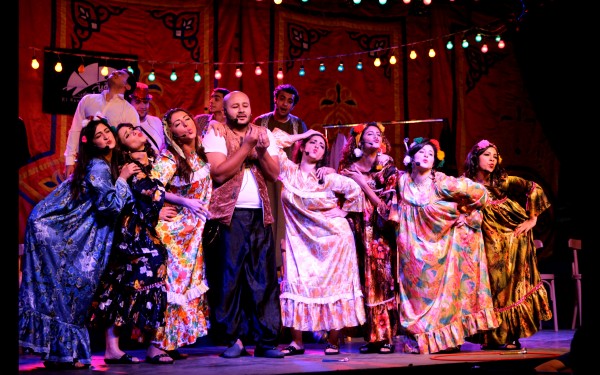BY MARY ARAVANI
@maryarav
![One of the scenes in El Leila El Kebira, performed by the crew members of Fabrica [Ghoneim]](http://www.auccaravan.com/wp-content/uploads/2014/11/Screen-Shot-2014-11-05-at-10.23.40-AM-e1415728872196.jpg)
Musical theater group Fabrica brought the Egyptian puppet show El Leila El Kebira (The Grand Night) back to life with a show-stopping rendition at the Sawy Culture Wheel last week.
El Leila El Kebira is a famous Egyptian puppet operetta that usually airs on television every year in celebration of the moulid – the Islamic observance of Prophet Muhammad’s birthday.
The operetta, which was written by Salah Jahin and composed by Sayed Mekawy in the 1960s, deals with traditions of the moulid in a humorous manner along with song.This unique approach made it the perfect choice for Fabrica’s performance.
“I was looking for a musical theater piece that was typically Egyptian and that didn’t need too much orchestra or dancing,” said Neveen Allouba, Fabrica’s founder and an adjunct faculty member of AUC’s Department of Arts.
Mohamed Abou El Kheir, director of the performance and also an adjunct faculty member of AUC’s department of Arts, was initially reluctant about the idea of recreating El Leila El Kebira because he wanted to approach the performance in an innovative way.
“I was against it at first because I couldn’t find anything extra to add to it,” Abou El Kheir said.
He added that restricting the performance to singing would be downgrading the troupe’s talent.
Despite Abou El Kheir’s reservations, Fabrica’s rendition of the famous show, which had them using human beings in place of the puppets and included extra scenes of humorous and relevant dialogue in between songs, grabbed audience attention right from the start.
Performers were on stage having conversations with each other half in character and half as themselves, with light remarks here and there to highlight each individual’s personality, while at the same time preserving the colloquial atmosphere of Egyptian villagers.
A light change followed the conversations, and suddenly the performers’ voices carried familiar tunes that filled the spaces between the crowd of more than 100 people.
“I loved the show very much. I wasn’t even planning on coming but I’m very happy that I did. It was very funny and they added a new, very good twist to it,” said 32-year-old audience member Nourhane Refaie.
One scene, in which two of the performers – a man and a woman – partook in a Sayed Mekawi sing-off, was particularly memorable to Bassem Amin, another audience member.
“I especially liked the technicality of their voices and also the way they seemed to put the people’s personalities into the character,” said 28-year-old Amin.
The musical theater group rose to fame after their Arabic rendition of the popular musical Les Misérables was showcased on Bassem Youssef’s El Bernameg (The Program) in June 2013.
At the time of the Les Misérables performance, Fabrica was mostly comprised of AUC students.
However, the group has since grown and has spread its roots all over the country, aiming to popularize musical theater in Egypt by translating popular western musicals into Arabic.
“I would love to target the public [outside of] Cairo. Cairo has a lot going on, but outside Cairo there are very few things going on,” said Allouba.
